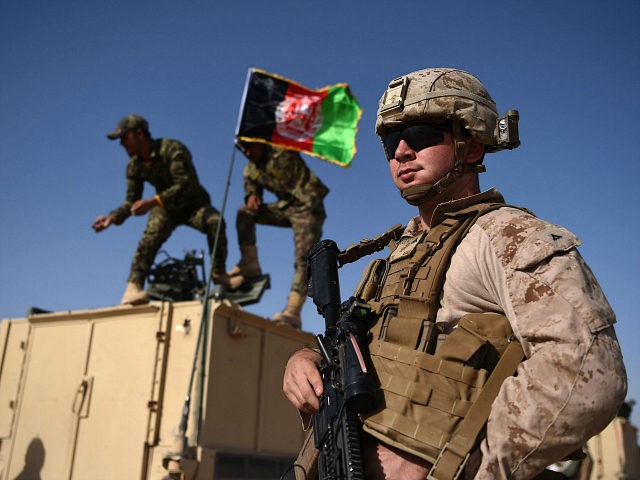The supreme leader of the Afghan Taliban rubber stamped Pakistan-based “exploratory talks” on re-engaging in peace negotiations to end the more than 16-year-old war in Afghanistan, reports Reuters, signaling that the jihadist group’s battlefield successes in days of yore may be gone.
Reuters notes:
A delegation approved by the Taliban’s supreme leader visited the Pakistani capital this week for exploratory talks on restarting peace negotiations to end Afghanistan’s 16-year war, two senior officials in the movement said. It was unclear if any progress was made in the unofficial meetings with a representative of a prominent Afghan politician. Many previous attempts have failed to revive direct talks that ended nearly as soon as they started in 2015.
The report comes soon after U.S. Ambassador to the United Nations Nikki Haley touted U.S. President Donald Trump’s Afghan war strategy as a success, noting, “We are seeing that we’re closer to talks with the Taliban and the peace process than we’ve seen before.”
Speaking to reporters after her trip to Kabul over the weekend, Haley added that Afghan officials are “starting to see the Taliban concede, they are starting to see them move towards coming to the table.”
Reuters acknowledges that the Afghan government and the Taliban did not confirm the alleged negotiations in Islamabad on the record, choosing to speak on condition of anonymity instead.
However, it learned from two anonymous senior Taliban officials that the group’s supreme leader Haibatullah Akhundzada had approved Monday’s meeting in Pakistan where he is believed to be hiding.
A three-member Taliban delegation from the group’s political office in Qatar included Shababuddin Dilawar, Jan Mohammad, and the brother-in-law of Mullah Jacoob, son of the late Taliban founder Mullah Mohammad Omar, Reuters reports.
The Taliban terrorists met representatives of Afghan politician Pir Syed Hamid Gilani, head of the National Islamic Front of Afghanistan, an unnamed senior aide to Afghan President Ashraf Gilani told Reuters.
Taliban jihadists have repeatedly declined to participate in peace negotiations for years, arguing that they were winning the war.
The so-called “exploratory talks” to end the war suggest that the Taliban is feeling the “pressure” applied by Trump’s policy as indicated by the top American commander in Afghanistan.
“In the face of this pressure, the Taliban cannot win. Their choices are to reconcile [with Kabul], live in irrelevance, or die,” U.S. Gen. John Nicholson, the commander of American and NATO troops in Afghanistan, told reporters in November 2017.
The top commander stressed that the primary goal of Trump’s Afghan strategy is to “pressure” the Taliban into “reconciliation, a negotiated settlement which lowers the level of violence.”
“Reconciliation will take some time,” conceded Nicholson.
Under Trump’s watch, the United States has launched a record number of airstrikes against terrorists in Afghanistan, targeting the Afghan Taliban’s economic engine—opium and heroin—while increasing assistance to the Afghan troops.
“This is a new war. The gloves are off, if you will, and we’ve got now these authorities we need to be able to go and target the Taliban network,” Brig. Gen. Lance Bunch, a top officer with U.S. Central Command (CENTCOM), told reporters in December.
“This entire effort is intended to put pressure on the Taliban, to have the Taliban understand you will not win a battlefield victory. … At some point, we have to come to the negotiating table and find a way to bring this to an end,” declared U.S. Secretary Rex Tillerson in August 2017. “
As of the end of September, the Taliban controlled or contested about 45 percent of Afghanistan, according to independent and U.S. government assessments.
While pressuring Pakistan to stop harboring the Afghan Taliban, the Trump administration has also pushed Islamabad to bring the terrorist organization to the peace pact table.
In August, Tillerson said Pakistan must play a central role in getting the Taliban to the negotiating table.
So far, the Trump administration has suspended more than $1 billion in security aid to Pakistan, noting that Islamabad could get the money if it takes “decisive action” against terrorist groups such as the Taliban and its al-Qaeda-linked ally, the Haqqani Network—considered the top threat currently facing U.S. troops.
It appears that the Trump administration’s approach is paying off. Pakistan hosted the recent negotiations to end the war that has cost the United States nearly $1 trillion, over 2,260 U.S. military deaths, and almost 20,290 injuries.
The recent talks in Islamabad came after an alleged back-channel meeting in Turkey over the weekend between Taliban-linked individuals and members of Hizb-i-Islami, the party of a former Taliban-allied chief known as the “butcher of Kabul” who reached a peace accord with Kabul in 2016.
Taliban jihadists and Kabul have denied engaging in talks in Turkey.

COMMENTS
Please let us know if you're having issues with commenting.